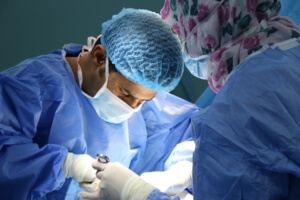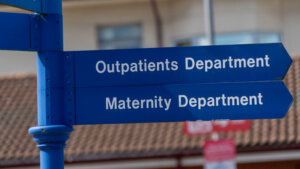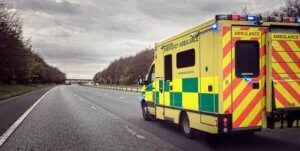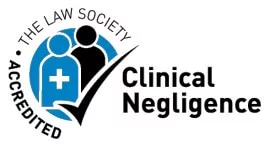Sepsis Claims
Claim Medical Negligence Compensation for Sepsis
If you or a loved one have suffered from sepsis, or another serious hospital infection due to medical negligence, you may be entitled to compensation. Our expert medical negligence solicitors have helped many families claim compensation after sepsis misdiagnosis and delayed treatment.
“Small but very effective and experienced team so every client benefits from the personal touch but also highly skilled litigation know-how. Capability of the team means they can handle all aspects of very complex cases as well as straightforward matters.”
“Osbornes Law is an established firm which handles a breadth of complex and high-value clinical negligence matters.”
What is sepsis and how can it lead to a medical negligence claim
Sepsis is a serious and potentially fatal condition that can develop when the body responds aggressively to an infection. If not diagnosed and treated quickly, it can lead to organ failure, long-term health complications, or death. Patients who have suffered harm due to delays in diagnosing or treating sepsis, or where sepsis was caused by poor medical care, may be entitled to bring a clinical negligence claim.
What are common causes of sepsis?
Sepsis can be caused any type of infection including bacterial, viral and fungal infections. Sepsis is susceptible to misdiagnosis because many symptoms are similar to less serious conditions such as flu or chest infections. Certain types of infections are more commonly linked to sepsis, including:
- Lung infections, such as pneumonia
- Kidney, bladder and urinary tract infections
- Infections in the gut
- Infected blood
- Wounds and burns
Related reading: Greater Awareness of Sepsis Needed
Can I claim compensation for sepsis negligence?
Yes, you may be able to make a negligence claim if your sepsis was misdiagnosis. Have you or someone close to you suffered long-term consequences due to an inadequately treated infection? Has someone has someone died that could have otherwise lived if the infection had been spotted on time. If medical negligence has resulted in injury or death, you may be able to claim compensation for medical negligence.
For sepsis claims to be successful, it must be shown that a duty of care was owed to the patient and that duty of care was breached, for whatever reason, resulting in harm. For example, if test results were misinterpreted or you were discharged despite showing clear symptoms.
How much compensation can you get for sepsis?
Compensation amounts for sepsis claims can vary significantly based on individual circumstances. Several factors are considered to determine the settlement amount. These include the severity and impact of the injury, loss of earnings, future care needs, and any additional expenses incurred due to the negligence. Read our guide to NHS compensation payouts for more information.
How do you make a sepsis negligence claim?
Making a sepsis claim can be complex and challenging, so it is vital to consult with a specialist clinical negligence solicitor to guide you through the process effectively.
1. Contact us for expert advice
We offer a free initial consultation to assess whether you have a strong sepsis negligence case. Meetings can take place at our offices, your home, or in hospital, wherever is most convenient.
2. Investigate your case
We will gather your medical records, take a detailed statement from you, and arrange independent medical reports to prove that negligent care caused or worsened your sepsis.
3. Build your claim
We’ll send a Letter of Claim to the NHS Trust or private provider, setting out the allegations. They must respond within four months.
4. Negotiate or go to court
If they accept responsibility, we will negotiate a settlement. If they deny fault, we are ready to issue court proceedings and fight for the compensation you deserve.
How long after contracting sepsis can I make a claim?
You usually have three years to bring a sepsis claim, either from the date the negligence occurred or when you first became aware of it. This is known as the limitation period under The Limitation Act 1980.
Calculating the limitation period can be complicated, particularly when working out the “date of knowledge,” so it’s vital to seek expert legal advice. Missing the deadline means you could lose the right to claim forever.
Can you make a no win no fee sepsis claim?
Yes, most sepsis claims are funded on a no win no fee basis, so there’s no financial risk to you.
Real life examples of sepsis cases
Toddler discharged with antibiotics
The actor Jason Watkins recently shared a devastating story about his two-year-old daughter. Toddler Maud had been suffering from a sore throat and shortness of breath. Her parents took her to hospital on two occasions, but she was discharged home with antibiotics. Sadly, she died during the night in her bed. The cause was sepsis.
11-year-old dies of septic shock
In another harrowing story, an 11-year-old boy injured his ankle while dancing. Shortly afterwards, he developed a fever. Over the next few days, his condition worsened, and he died from septic shock. The NHS Trust admitted that ‘early signs of sepsis’ were evident on his visit to the hospital and that if he had been treated promptly, he would likely have survived.
Strep A fatal for 14 care home residents
In September this year, it was confirmed by NHS Mid Essex that 14 people have now died from Strep A infection. In total 37 people in the area have been infected, with symptoms ranging from a simple sore throat, to a high fever and vomiting. All affected are elderly and most were receiving treatment for wounds, either in care homes or in their own homes. It is thought that the infection may have been spread by unknowingly contaminated health care workers who were treating the wounds.
Why choose Osbornes Law for your sepsis claim?
- We will review your potential sepsis claims by advising you on suing the NHS for negligence or other alternative procedures if your case does not relate to NHS care and treatment.
- We will not charge a fee for our time in reviewing your case.
- We can assist you with any issues that you may have regarding the complaints procedure or that you encounter in obtaining copies of your medical records.
- We will advise you of the course of action with respect to your case.
If you think you may have a case for compensation due to medical negligence, please contact our specialist team. We are ready to hear from you, and we want to help.
- Call 020 7485 8811, or
- Complete our online contact form.
Sepsis FAQs
What causes sepsis?
When the body gets infected, the immune system identifies an invading bacteria or virus and mounts an inflammatory immune response which inadvertently causes damage to the body’s own organs and tissues.
What are the symptoms of sepsis?
Symptoms of sepsis can include a high fever, increased breathing and heart rate and confusion. Sepsis can reduce blood flow to organs, causing tissue damage.
What is the death rate from sepsis?
The risk of death from sepsis depends on the severity and if it responds to treatment: for severe sepsis, the death rate can be as high as 50%, and for septic shock as high as 80%. However, if the symptoms are recognised early and treated correctly, most people will fully recover. Even so, in the UK, 5 people every hour dies from sepsis.
How does Strep A cause sepsis?
Strep A is a group of bacteria that can cause a wide range of infections, from mild illnesses like sore throats and skin infections to much more serious conditions. Under the microscope, these bacteria appear as short chains, resembling strings of beads.
While many Strep A infections are mild, the bacteria can become life-threatening if they spread deeper into the body. When Strep A bacteria invade the blood, lungs, or other organs, the body can react with an extreme immune response, leading to sepsis. Without prompt diagnosis and treatment, sepsis caused by Strep A can rapidly become life-threatening.
How does Strep B cause sepsis?
Strep B (Group B Streptococcus) is a common type of bacteria that lives harmlessly in the gut and genitourinary tracts of around one in three healthy adults. Most people carry Strep B without any symptoms or health problems, and are unaware they have it.
While Strep B is usually harmless, it can become dangerous if the bacteria spread into other parts of the body. In vulnerable individuals, such as newborn babies, elderly adults, or people with weakened immune systems. Strep B infections can quickly escalate, leading to serious complications like sepsis, pneumonia, and meningitis.
Can you sue the NHS for sepsis?
Yes, you can. Sepsis is one of the three most common claims brought against the NHS.
Speak to us about a sepsis claim
Call us 020 7485 8811
Email us Send us an email and we’ll get back to you
Small but very effective and experienced team so every client benefits from the personal touch but also highly skilled litigation know-how. Capability of the team means they can handle all aspects of very complex cases as well as straightforward matters.
Jodi Newton holds over 20 years of experience in birth and surgical injury cases, including those pertaining to cerebral palsy, negligent treatment of sepsis, and negligent A&E treatment.
Osbornes is a very respected firm in the marketplace.
They handle really complex cases very well
The clinical negligence team are knowledgeable and professional in their approach and demonstrate a high level of skill in litigation work.
Osbornes Law offers experience in obstetric and fatal claims as well as niche cauda equina cases.
Osbornes Law is an established firm which handles a breadth of complex and high-value clinical negligence matters.
Osbornes has a skilled team of solicitors advising clients on a wide range of clinical negligence matters.
Hard working, approachable, good knowledge of clinical negligence and clients’ specific conditions
A joy to work with and always 100% client focused at all times.
The clinical negligence team at Osbornes is much lauded for its ability to ‘represent the diverse range of London-based clients
“The team is very quick and efficient in responding."
"Obsbornes Law is always client-focused and works tirelessly to obtain the best outcomes for clients."
‘They are ambitious for their clients and expect high standards from all who work with them.’
"Osbornes somehow combine the accessibility of a local firm, with the professional standards of a national or city outfit."
"Osbornes, is described as having ‘superb judgement and a medical knowledge that is second to none."
Stephanie has developed a particularly strong reputation for her handling of birth injury claims, as well as cases concerning surgical negligence and delays in surgery.
"An excellent firm which achieves fantastic outcomes for clients."
"Stephanie Prior takes on complex cases and gets excellent results. She has a background in medicine which serves her clients well and is a realistic but tough litigator."
"Stephanie Prior is hugely dedicated, adored by her clients, tenacious, efficient and extremely knowledgeable."
"Stephanie Prior is very good with troubled clients and is easily able to make them feel at ease."
"Stephanie shows sensitivity and deals with things in an understanding way."
Osbornes provides a very intimate and personal client service which is increasingly rare in this sector.
The lawyers in the team are highly experienced and will drive cases very hard on behalf of their clients.
"Stephanie Prior has a realistic attitude to the complexities of the cases. She wins the trust of her clients and goes the extra mile to ensure they get the best outcomes."
"Stephanie Prior... manages a varied caseload, including obstetric claims, child and adult brain injury cases and fatal and non-fatal spinal cord injury cases."
"Stephanie is experienced, knowledgeable of all aspects of clinical negligence work, and strategic in running cases."
"An exceptional outfit. They take on difficult cases, fight hard and win."
"The team were extremely professional in putting my needs first. There was a joined-up approach to catering for the client, and all lawyers involved were briefed and constructive."
Stephanie Prior is always very professional and kind. Highly recommended.
Quite simply excellent, with a highly competent and well-rounded team. They understand complex medical litigation and have been our lifesavers, and we will always owe them our immense gratitude.
News & InsightsVIEW ALL
- 10.7.2025
Osbornes Law Secures £700K in Crohn’s Negligence...
Negligent delay in diagnosing Crohn’s disease leads to £700K settlement Jodi Newton, Partner, was instructed in a case against...
Read more - 13.5.2025
Damages Recovered for Necrotic Pressure Sore
Elline Demetriou recovers damages following a necrotic pressure sore on her client’s heel Elline Demetriou, Solicitor in our clinical...
Read more - 12.5.2025
Complaints Against Suspended Surgeon Ms Kuldeep Stohr
Ms Kuldeep Stohr, orthopaedic surgeon at Addenbrooke’s Hospital suspended In February 2025, Cambridge University Hospitals NHS Foundation Trust (CUH) confirmed...
Read more - 6.5.2025
Six-Figure Settlement for Negligent C-Section Delivery
Osbornes secures a six-figure settlement following a negligent caesarean section delivery Jodi Newton, Partner and head of our Obstetric and...
Read more - 6.5.2025
Six-Figure Settlement for Negligent Shoulder Surgery
Settlement following a claim against Bedfordshire Hospitals NHS Foundation Trust Elline Demetriou, a Solicitor in our clinical negligence team, acted...
Read more - 29.4.2025
Five-Figure Settlement in Fatal Medical Negligence Case
Osbornes Law secures a five-figure compensation following a fatal medical negligence claim Osbornes acted for our client, E, who brought...
Read more - 4.4.2025
Time To Move On From Physician Associates?
BMA raises concerns over patient safety: the risks of Physician and Anaesthesia Associates in the NHS The British Medical Association (...
Read more - 13.3.2025
Addenbrooke’s Hospital Complaints
Review finds harm to children by surgeon at Addenbrooke’s Hospital An independent review by Cambridge University Hospitals NHS Foundation...
Read more - 4.2.2025
Claim Settled for Child’s Surgery Injuries
Osbornes secures settlement for child’s surgery-related injuries Osbornes Law successfully represented a minor, X, in a claim against two...
Read more - 29.1.2025
£27,000 DVT Claim Settled Against Royal Free London NHS
Successful settlement for DVT case against Royal Free London NHS Foundation Trust Successful Settlement of £27,000.00 for DVT Claim against Royal...
Read more - 14.10.2024
Multi-Million Settlement in Cerebral Palsy Negligence Case
Judge awards multi-million settlement in cerebral palsy medical negligence claim Jodi Newton, Partner and specialist medical negligence lawyer at Osbornes...
Read more - 19.9.2024
Report highlights failings in maternity care
The Care Quality Commission (CQC) has recently carried out a national review of 131 maternity inspections between 2022 and 2024, finding that failures...
Read more - 12.9.2024
Great Ormond Street Hospital Negligence & How to Claim
Review of negligence at Great Ormond Street Hospital At Osbornes Law, we’ve supported families through some of the most...
Read more - 29.8.2024
AB v Central London Community Healthcare NHS Trust
Background Our client, AB, had been using the Nexplanon contraceptive device for 6 years. She had a Nexplanon device inserted into...
Read more - 30.7.2024
What Is the Role Of a Physician Associate?
What does the Position of Physician Associate Mean for the NHS? There are many different jobs within the NHS, each...
Read more - 17.7.2024
Settlement for Delay in Wrist Fracture Treatment
Our Clinical Negligence team have recently agreed the settlement of a case relating to a delay in the treatment of...
Read more - 28.6.2024
£55,000 Settlement for Stillbirth Claim Against Chelsea and Westminster...
Successful Settlement for Stillbirth Claim Against Chelsea and Westminster Hospital NHS Foundation Trust Background Nick Leahy, an Associate in our...
Read more - 9.5.2024
Claim Against Royal Free London NHS Foundation Trust...
Client obtains settlement after being victim of a surgical negligence Jodi Newton, Partner in our Clinical Negligence department, recently settled...
Read more - 30.4.2024
Settlement In Neonatal Death Case
Settlement in fatal medical negligence case against King’s College Hospital Nick Leahy, Associate in our Clinical Negligence department, recently...
Read more - 8.4.2024
Epilepsy Negligence Compensation Claim
Nicholas Leahy, an Associate in the Clinical Negligence team at Osbornes Law, has recently settled a long-running fatal medical negligence...
Read more - 11.1.2024
New UK Supreme Court Ruling regarding Secondary Victims...
The Supreme Court has today, on the 11th January 2024, upheld the Court of Appeal’s order to dismiss the claims...
Read more - 11.1.2024
Secondary Victim Claims
Secondary victims in clinical negligence cases What is a secondary victim in clinical negligence cases? Most compensation claims are concerned...
Read more - 5.1.2024
Delayed Pre-Eclampsia Diagnosis Results in Loss of Baby
Introduction to the case Nick Leahy, Associate in our Clinical Negligence department, has recently settled a birth injury claim against...
Read more - 12.12.2023
NHS Compensation Payouts Guide
What Are NHS Compensation Payouts? In the UK, the National Health Service delivers the vast majority of healthcare services. When...
Read more
































